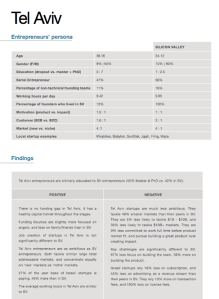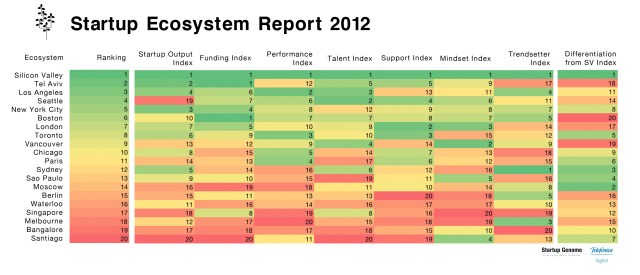Today, the Startup Genome released the first half of its massive 160-page report on the world’s top startup ecosystems. Of the many moving parts of the report, the most noteworthy (and potentially controversial) is it’s so-called Startup Ecosystem Index, which ranks the world’s top 20 startup ecosystems, a la college football.
For those unfamiliar, the ambitious, collaborative R&D project known as “Startup Genome” was created by three young entrepreneurs, Bjoern Herrmann, Max Marmer, and Ertan Dogrultan, who set out to take a comprehensive, data-driven dive into what makes startups successful — or go the way of the Dodo.
Out of its initial research came Startup Compass: A benchmarking tool that leverages the research project’s data to enable startups and their founders to evaluate their progress compared to others in their space and help them make more informed product and business decisions by “utilizing a data-driven feedback loop,” according to its mission statement.
Today, nearly two years after the project began, the team has compiled data on more than 50,000 startups around the world through Startup Compass and more than 50 in-depth, qualitative interviews conducted with entrepreneurs and investors. The results are a substantial update from the mini report the founders released back in April, which gave a preliminary look into the world’s top startup ecosystems, beginning with what it found to be the three most active hubs: Silicon Valley, New York City and London.
The comparative analysis, produced in collaboration with affiliates from UC Berkeley, Stanford and Telefónica Digital, covers a host of topics, including how the landscape of startup ecosystems has begun to extend beyond Silicon Valley to become somewhat of a global phenomenon. The report compiled a global ranking of startup ecosystems based on a 50-variable, 8-component index, which includes Startup Output, Funding, Company Performance, Talent, Support Infrastructure, Entrepreneurial Mindset, Trendsetting Tendencies and Ecosystem Differentiation.
 Unsurprisingly, atop the rankings sits Silicon Valley, which remains the mecca of entrepreneurship and was used as a baseline from which to compare the rest of the list. Coming in second is Tel Aviv, followed by Los Angeles, Seattle, New York City and Boston, before crossing the Atlantic to London — which ranked as the largest ecosystem in Europe. While five of the top startup ecosystems in the world are in the U.S., the rest of the world is catching up.
Unsurprisingly, atop the rankings sits Silicon Valley, which remains the mecca of entrepreneurship and was used as a baseline from which to compare the rest of the list. Coming in second is Tel Aviv, followed by Los Angeles, Seattle, New York City and Boston, before crossing the Atlantic to London — which ranked as the largest ecosystem in Europe. While five of the top startup ecosystems in the world are in the U.S., the rest of the world is catching up.
Below you’ll find eight insights into the comparative data intended to get entrepreneurs, founders and the industry at large to consider what’s working and what isn’t, which is then followed by the actual rankings. Readers can find more on how the report defines its terms in our coverage here or on the project’s blog here. There’s also a glossary here.
Noticeably missing from the top ranks? Asian startup ecosystems. Hermann said that this was a result of the fact that, although the project had collected data on 50K companies, it did not have enough data on Asian regions to compare them properly. So, consider this, among other things, as reasons for taking the results with a grain of salt, as the project is still developing.
- Even developed ecosystems such as New York and London have more than 70 percent less risk
- capital available than Silicon Valley for Startups in the early, “PreProduct Market Fit” Stages of the Startup Lifecycle.
- Silicon Valley has left its imprint on global startup ecosystems all over the world through fluid immigration and emigration patterns. Berlin and Sao Paulo have the fewest number of founders that have lived in Silicon Valley previously, with 4 percent and 7 percent respectively, whereas Singapore and Waterloo have the most founders that have lived in Silicon Valley with 33 percent and 35 percent, respectively.
- Sydney, Sao Paulo and Moscow are the startup ecosystems that are the most differentiated from Silicon Valley in terms of the types of startups being developed.
- Sydney is the global capital of data-driven startups.
- The cultural prominence of France’s private education system has strongly influenced the mentality of the Parisian population, with more than 96 percent of founders in the ecosystem completing at least a masters degree or a PhD before starting a company.
- Entrepreneurs in Tel Aviv have a hard time adopting new technology trends, as more than 80 percent of startups use the historically popular programming languages of PHP, C++, Java and .Net, despite a number of those languages rapidly falling out of fashion in Silicon Valley and elsewhere, in favor of Ruby, Python and Javascript, for example.
- Even though Singapore has a relatively strong funding environment, the risk tolerance of the founders there is the lowest among the top 20 startup ecosystems.
- Melbourne is an up-and-coming startup ecosystem that ranks high in terms of adopting new trends within the startup world, but one of its biggest pain points is that local companies limit their potential by targeting very small niche markets.
Here are the top 20, in order:
- Silicon Valley
- Tel Aviv
- Los Angeles
- Seattle
- New York City
- Boston
- London
- Toronto
- Vancouver
- Chicago
- Paris
- Sydney
- Sao Paulo
- Moscow
- Berlin
- Waterloo (Canada)
- Singapore
- Melbourne
- Bangalore
- Santiago

